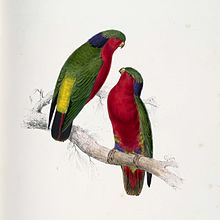Kuhl's lorikeet
| Kuhl's lorikeet | |
|---|---|

| |
| A lithograph by Edward Lear | |
| Scientific classification | |
| Kingdom: | |
| Phylum: | |
| Class: | |
| Order: | |
| Superfamily: | |
| Family: | |
| Subfamily: | |
| Tribe: | |
| Genus: | |
| Species: | V. kuhlii
|
| Binomial name | |
| Vini kuhlii (Vigors, 1824)
| |
| Synonyms | |
|
Coriphilus kuhli (lapsus) | |
Kuhl's lorikeet (Vini kuhlii), also called Rimatara lorikeet, Rimitara lorikeet, Kuhl's lory, or Kura, is a species of lorikeet in the family Psittaculidae. It is one of several species of Vini lorikeets found in islands ranging across the South Pacific.
Description
It is a fast flying lorikeet with vibrant plumage; a green back, wings and crown, a blue nape and legs and bright red undersides and cheeks.
Habitat
The Kuhl's lorikeet's habitat is natural tropical moist lowland forests and plantations. Like all Vini lorikeets it is a nectarivore, and has a brushy tongue to acquire the nectar. In islands denuded of native forests and covered with extensive coconut plantations it is found exclusively in those areas.
Status and conservation
Studies of fossils have shown that it once had a widespread distribution from the Cook Islands to French Polynesia. Its range contracted greatly after the arrival of humans, until the only surviving natural population was on Rimatara in the Tubuai Islands. Like many island species the Kuhl's lorikeet is threatened by introduced black rats. Its colourful feathers have also meant that the species was regularly hunted. The species was also introduced to several islands in Kiribati. The last native population was protected by a tapu or taboo by the Queen of Rimatara around 1900. In 2007 a population was reintroduced to the black-rat-free island of Atiu in the Cook Islands by BirdLife International, the Cook Islands Natural Heritage Trust and numerous conservation bodies, including the San Diego Zoo Institute for Conservation Research. In 2008, the introduced population was found to be reproducing.
References
- Birdlife International 2007. Saved by one Queen and brought home by another: Rimatara Lorikeet returns to the Cook Islands Downloaded on 27 September 2007
- Chong F, Kape J. (2010). "'Ia ora te 'Ura! Vive le 'Ura! 'Ura, un tres bel oiseau endemique de Rimatara menace", Bulletin de la Societe des Etudes oceaniennes, (319): 10-33.
- McCormack, G. (2008). "The Rimatara Lorikeet or Kura in Atiu (Cook Islands): First Annual Report". pdf.
- Steadman D. (2006). Extinction and Biogeography in Tropical Pacific Birds, University of Chicago Press. ISBN 978-0-226-77142-7

